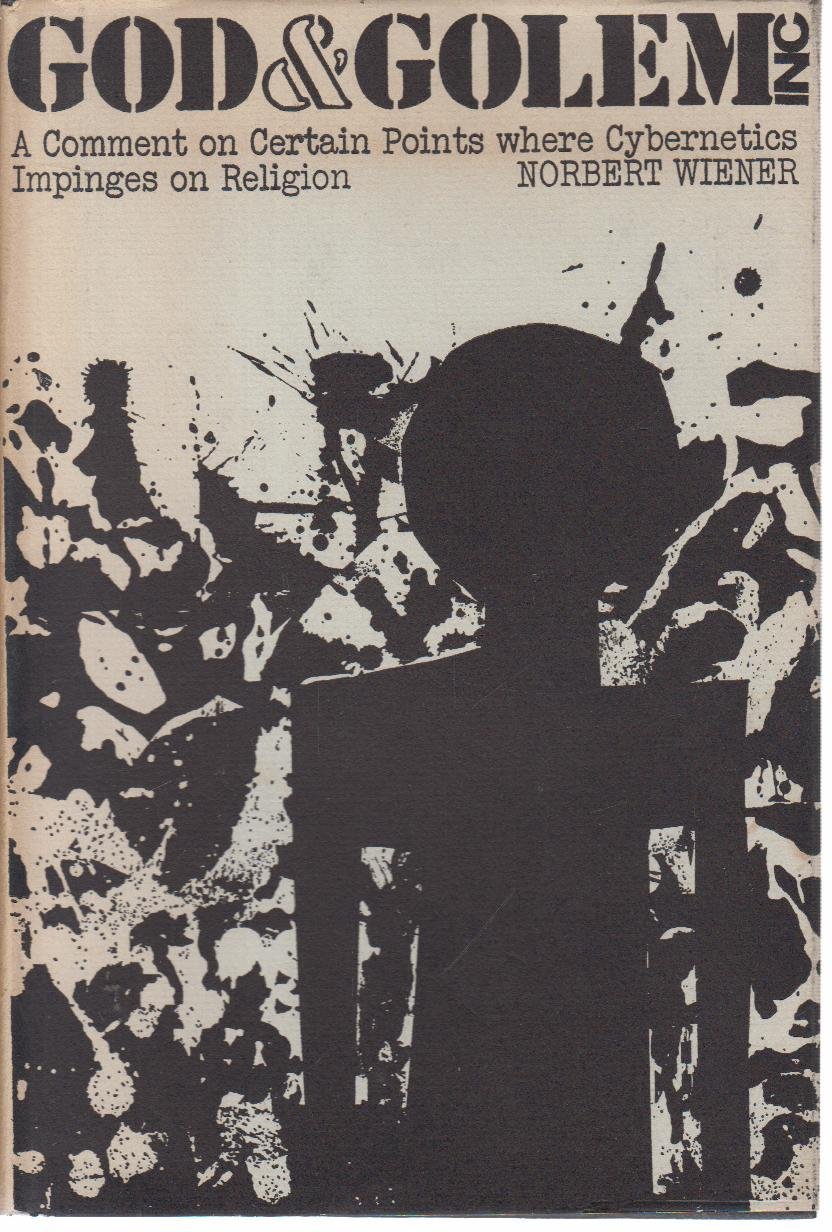What do you think?
Rate this book


Hardcover
First published January 1, 1964
Thus, if we do not lose ourselves in the dogmas of omnipotence and omniscience, the conflict between God and the Devil is real conflict, and God is something less than absolutely omnipotent. He is actually engaged in a conflict with his creature,in which he may very well loose the game. And yet his creature is made by him according to his own free will and would seem to derive all its possibility of action from God himself. Can God play a significant game with his own creature? Can any creator, even a limited one, play a significant game with his own creature?Well this theological paradox stands only if you exclude creatures with free will.... Much of this book is Weiner’s theological spin on certain issues. He appears to have read Dostoyevsky as on page 52 he states “For whether we believe or not in God and his greater glory, not all things are equally permitted to us.” Which of course raises the question “Why not?” If Weiner were living today, I wonder what he would say about a hard-nosed materialist like Richard Dawkins who recently declared himself a “cultural-Christian”.... Now the philosopher Frederick Nietzsche would have nothing but contempt for atheists such as Dawkins who reject the Christian God, but would like to keep Judeo-Christian morality. In his 1889 essay Twilight of the Idols (ix.5), Nietzsche cynically observed:
"G. Eliot. They are rid of the Christian God and now believe all the more firmly that they must cling to Christian morality. That is an English consistency; we do not wish to hold it against little moralistic females à la Eliot. In England one must rehabilitate oneself after every little emancipation from theology by showing in a veritably awe-inspiring manner what a moral fanatic one is. That is the penance they pay there.In his autobiography (Surprised by Joy), shortly after WWI when he began his university studies Lewis observed that little had changed since Nietzsche’s initial observations (1955 : 209-210)
"We others hold otherwise. When one gives up the Christian faith, one pulls the right to Christian morality out from under one's feet . This morality is by no means self-evident: this point has to be exhibited again and again, despite the English flatheads. Christianity is a system, a whole view of things thought out together. By breaking one main concept out of it, the faith in God, one breaks the whole: nothing necessary remains in one's hands. Christianity presupposes that man does not know, cannot know, what is good for him, what evil: he believes in God, who alone knows it. Christian morality is a command; its origin is transcendent; it is beyond all criticism, all right to criticism; it has truth only if God is the truth ⎯ it stands or falls with faith in God.
"When the English actually believe that they know 'intuitively' what is good and evil, when they therefore suppose that they no longer require Christianity as the guarantee of morality, we merely witness the effects of the dominion of the Christian value judgment and an expression of the strength and depth of this dominion: such that the origin of English morality has been forgotten, such that the very conditional character of its right to existence is no longer felt. For the English, morality is not yet a problem."
“But there were in those days all sorts of blankets, insulators, and insurances which enabled one to get all the conveniences of Theism, without believing in God. The English Hegelians, writers like T. H. Green, Bradley, and Bosanquet (then mighty names), dealt in precisely such wares. The Absolute Mind — better still, the Absolute — was impersonal, or it knew itself (but not us?) only in us, and it was so absolute that it wasn't really much more like a mind than anything else. And anyway, the more muddled one got about it and the more contradictions one committed, the more this proved that our discursive thought moved only on the level of "Appearance", and "Reality" must be somewhere else. And where else but, of course, in the Absolute? There, not here, was "the fuller splendour" behind the "sensuous curtain". The emotion that went with all this was certainly religious. But this was a religion that cost nothing. We could talk religiously about the Absolute: but there was no danger of Its doing anything about us. It was "there"; safely and immovably "there". It would never come "here", never (to be blunt) make a nuisance of Itself. This quasi-religion was all a one-way street; all eros (as Dr. Nygren would say) steaming up, but no agape darting down. There was nothing to fear; better still, nothing to obey.”So part of Dawkins recent comments (calling himself a ‘Cultural Christian’) may come from a growing realisation that Islam could take over Europe or at least gain political influence. While people like Dawkins had great fun criticising Christianity, criticising Islam is not all fun and games. Ask Salmon Rushdie. Ask the Charlie Hebdo survivors or Bataclan survivors... Who knows if the hard-nosed materialists like Weiner or Dawkins that so dominated Western culture in the 20th century, may be on their way out in the 21st.